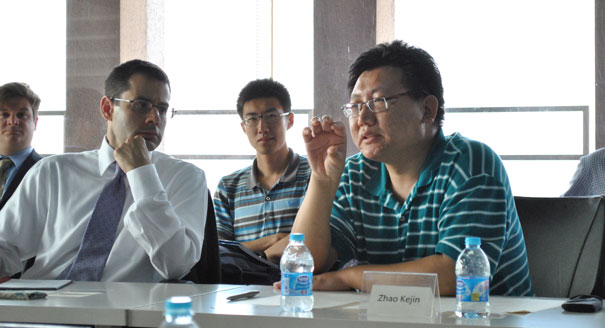Registration
Thank you!
You will receive an email confirming your registration.
IMGXYZ4253IMGZYXThe main challenge facing Chinese foreign policy is how China engages the United States. How the two countries interact in the Asian-Pacific region and interact with other states will determine the future of the tenuous relationship. Carnegie-Tsinghua Center for Global Policy Resident Scholar Sun Xuefeng hosted a roundtable discussion about the chief challenges to China’s foreign.
The Perspective From the United States
- Election Rhetoric About China: According to Michael Auslin, director of Japan studies at the American Enterprise Institute, the current presidential election season in the United States also has a strong effect on U.S.-China relations. The negative election rhetoric is exacerbating the relationship, even as it pushes the bilateral relationship into the background with the debate centered on domestic issues. This creates a double negative effect.
- Shift in Tone About China: Auslin added that there has been a change in the general tone toward China. He described it as more skeptical with more pessimism over the potential for cooperation and multilateralism between China and the United States. While not a regression, the current government’s expectations do not coincide with the reality, Auslin and other U.S. officials explained. He encouraged adopting a “healthy realism.”
- A Realistic Assessment of U.S. Policy Goals: The Obama administration does not like the term “pivot” when referring to the U.S. shift in focus to Asia and the Pacific, Auslin said; instead, they call it “rebalancing.” There has been a change in rhetoric regarding this shift. Because the United States remains a global power with priorities in Iran and Europe, the pivot may be unrealistic and constrained by financial difficulties. However, Auslin added, the United States has no long-term strategy for dealing with daily issues.
Lack of Clear Communication Between Beijing and Washington
- U.S. Pulse on Beijing is Weak: Auslin stated that there is no understanding in Washington of what Beijing is thinking. There is uncertainty over whether Beijing views the international community as benign or dangerous and how China views stability, regional conflicts, and nuclear security. Auslin explained that Beijing has been perceived as acting only in its own interests.
- Trade Relations Growing Tense: Auslin explained that tensions were rising between U.S. trading partners, especially Japan and South Korea, and China. Domestic politics may also shift regional tensions. For example, the upcoming presidential election in Korea could mean a shift to the left and toward China. Between Japan and China, there is high economic interdependence, but no political or social trust, and an even greater distrust of China’s military buildup, Auslin continued. These relationships have a great influence on U.S. policy in the region. Auslin explained that if China can improve its ties in the region, the United States will likely continue to reduce its military budget and move assets out of Asia.
View From China
- Foreign Relations in Better Times: Shi Yinhong, professor at Renmin University, stated that in 2002, China enjoyed stronger relations with its neighbors. He elaborated that at that time, China emphasized GDP growth over security. In addition, China had fewer domestic problems then.
- Moving Forward: Shi explained that over the last decade, everything has changed in China. The structure of politics and diplomacy has changed in China, with the focus now on the United States rather than regional neighbors. As a result, regional tensions and complications in the U.S.-China relationship have increased. Shi’s assessment was that China perceives a loss of influence in the region and feels “squeezed” by the United States. Carnegie-Tsinghua’s Zhao Kejin added that the leadership in Beijing needs to develop a stronger global strategy. Currently, China is too focused on economics and remains pessimistic in forming its security strategy
. - Struggles for the Leadership: Zhao added that public opinion is a significant factor in the government’s tough stance on security. He contended that public opinion is playing too large of a role. Yu Wanli, associate professor at Peking University, responded that Chinese foreign policy has a strategic gap between expectations and reality. This gap is due to the inefficient structure of foreign policy decisionmaking in China, which is shaped like a top-down pyramid with, as Yu described, “nine presidents” that form the standing committee.
- United States and China Must Work Together: Carnegie-Tsinghua’s Chen Qi concluded that there is no way to truly mitigate these concerns. China has followed the U.S. model of foreign policymaking and has mirrored Washington’s assertive stance in the Asia-Pacific.
Discussants: Shi Yinhong, Yu Wanl
